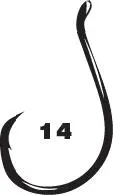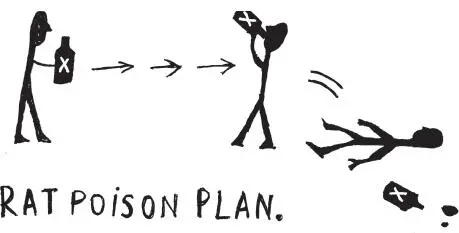He’d licked his thumb to accentuate his vow, to make me see that it was a vow. He was determined. He’d lifted the buckets of water he’d fetched and gone into the house, leaving me standing there, beginning to wonder — as he always left me to do — if I missed my brothers, Ikenna and Boja, just as he did. Then I would comfort myself by the conviction that I did, but was merely scared of the madman. I could not kill, either. It is evil, and how might I, only a child, do it? But my brother had said he would carry out the plan with all the powers of persuasion, determined that he would succeed, for his desire had become an indestructible leech.
Chapter 14: The Leviathan
 THE LEVIATHAN
THE LEVIATHAN
But Abulu was a leviathan:
An undying whale that could not be easily killed by a band of valiant sailors. He could not die as easily as other men of flesh and blood. Although he was no different from other people of his kind — the insane vagabond who wallowed, by reason of his mental condition, in the lowest level of privation possible and was thus exposed to extreme dangers — he’d probably had closer shaves with death than any one of them. It was known too well that he mainly fed on filth — filth from dumps. Because he had no house, he fed from whatever he chanced upon — leftover meat scattered around the open-pavilioned abattoirs, crumbs of food from dumps, fruits dropped from trees. To have fed from there, for so long, one would expect him to have long contracted some infirmity. But he lived, hale and healthy, his belly bulging into a paunch. When he walked on a bed of shattered glass and bled out, people thought that was it, but he showed up again within days. Yet, these were only little stories of what should have killed the madman; there were many more.
Solomon had told us, when we convened at the Omi-Ala the day after the encounter with Abulu, that the reason he’d warned us sternly not to listen to Abulu’s prophecy was because he believed Abulu was an evil spirit manifesting in bodily form. To buttress this point, he told us of something he’d witnessed many months earlier. Abulu was walking by a roadside when he suddenly stopped. It was drizzling, and the rain was making him wet. Facing the road, the madman began calling to his mother who he believed was standing in the centre of the road, pleading with her to forgive him for all he did to her. As he pleaded, apparently conversing with her, he saw a car racing down from the other side of the road. Frightened, he began shouting to his mother to leave the road, but the apparition, who the madman was convinced was real, stood firm in the heart of the road. Abulu dashed onto the road just in the moment the car reached where he thought his mother had stood, to save her. The car swiftly pushed him to a grassy shoulder of the road, and slightly skidded off the road into the nearby bush before pulling to a halt. It was said that Abulu, thought to have immediately died, lay still for a while where the car had left him. Then he scrambled to his feet, bloodied all over, a gape on his forehead. When he stood, he began flapping his drenched clothes as though the car had merely blown a cloud of dust on him. He would limp away, frequently turning to the way the car had gone and saying: “Do you want to kill someone, eh? Can’t you stop when you see a woman on the road? Do you want to kill a person?” He limped on, asking innumerable questions as he went away, sometimes stopping to take a backward glance with his hand on the lobe of his ear to admonish the driver to drive slowly next time: “You hear, you hear?”
The day after Father announced our potential immigration to Canada, my brother shoved a sketch into my hand, and I sat gazing at it while he spoke.

“We could kill him with Ota-pia-pia . We could buy one and put it in bread or something, and give the madman, since he eats from everywhere and just about anything.”
“Yes,” I agreed, “he even feeds from gutters.”
“That’s true,” he said, and nodded. “But have you thought of why those years of feeding from these things haven’t killed him? Isn’t it from dumps and trash heaps he feeds? Why hasn’t he died?”
He expected an answer, but I said nothing.
“You remember the story Solomon told us about why he was really scared of him and wouldn’t want to have anything to do with him?”
I nodded.
“You see, then? Listen, while we must not give up, we must know that this man is strange. These stupid people”—the way he now referred to the people of Akure town because they allowed the madman to remain alive—“believe he is a kind of supernatural being who cannot be physically killed because; you know, they foolishly think his years of living outside the realm of human reasoning have altered his humanity, and hence he is no longer a mortal man.”
“Is this true?” I asked.
“If we feed him poisoned bread, people will think he died from something he ate by himself from some garbage dump.” I did not ask him how he’d found this out because he was the keeper of secret knowledge whom I unquestioningly believed. So, a while later, we went out with the front pockets of my brother’s shorts swollen with shredded pieces of bread marinated with rodenticide packed in a small sack. He’d got the bread by slicing out a piece from his breakfast the previous day. My brother had brought out the shrivelled crumbs and laced them some more with the poisoned mixture, filling the room with the piquant odour. He’d said that he wanted us to go out on “this mission” just once, and that would be it — just once. Armed with these, we went to the truck where Abulu lived, but he was not there. Although we’d heard that its door could still open and close, the truck was left almost perpetually opened. There were the rickety seats that were shrunken to their wooden bones, their flesh — the leather coverings — torn or worn off. Its rusted roof had holes through which rain entered. The seats were filled with various waste materials: a used blue curtain, which reached from the seat to the floor of the truck; the frame of an old kerosene lantern with its glass tube missing; a stick; papers; wrecked shoes; tins; and many other items picked from some trash.
“Perhaps it is not yet time,” my brother said. “Let’s return home and come back in the afternoon; perhaps we will find him then.”
We went home, and returned later that afternoon, after Mother had briefly come home to boil yams for lunch and gone back to her shop. When we got there, the madman was there all right, but nothing had prepared us for what we’d encounter. He was bent over a wok set on two big stones, and was emptying the liquid content of a water bottle. Pieces of wood — apparently intended as firewood — were piled between the stones, but they were unlit. After draining off the content of the bottle into the earthenware, the madman took up a beverage can whose content we could not easily decipher, turned it into the wok, and began painstakingly emptying its content into it. He would shake the tin, peer into it microscopically, and scratch out its content into the wok until, satisfied he’d emptied it, he placed the tin delicately on a small stool on which was a pile of assorted things. Then, dashing into his truck, he returned with what appeared to be a pack of leaves, some bones, a spherical object, a white powder that must have been salt or sugar. He poured these things into the wok and stepped back with a jolt as if he’d encountered the inflammable effect of plunging things into heated oil. It became clear, to my utter bemusement, that the madman was — or thought he was — cooking a gallimaufry of filth and waste materials. For a moment, we abandoned our quest and stood watching the scenario in disbelief until two men stopped by to join us as spectators of Abulu in his kitchen.
Читать дальше

 THE LEVIATHAN
THE LEVIATHAN











